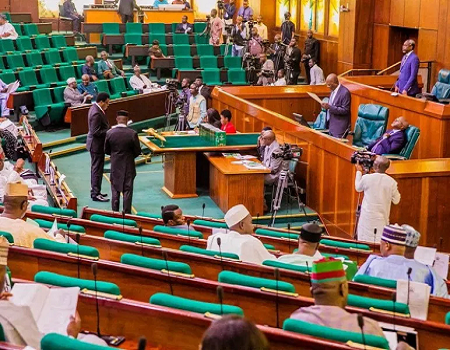The House of Representatives on Thursday passed through Second Reading a bill which seeks to protect capital market investors, ensure and maintain fair, efficient and transparent market and reduction of systemic risk in the Nigerian capital market.
The private member bill, seek to repeal the Investments and Securities Act, 2007 and enact the Investments and Securities bill which seeks to establish Security and Exchange Commission as the apex regulatory authority for the Nigerian capital market and other related matters.
In his lead debate, Hon. Ibrahim Babangida explained that the current enabling law for the Nigerian capital market, the Investments and Securities Act, Act No. 29 of 2007 (“ISA”) was signed into law by late President Umar Musa Yar’adua in June 2007 (14 years ago).
According to him, the current trends in capital markets regulation have made it imperative to make major improvements to the Act to align our market with international standards.
This Bill increases the number of sections in the ISA 2007 from 316 to 351.
Amongst others, the major essence of this Bill is to: enhancement of provisions relating to efficient regulation of investment schemes and to effectively combat the proliferation of Ponzi schemes in Nigeria.
ALSO READ FROM NIGERIAN TRIBUNE
- Police, Amotekun After Criminals On Lagos-Ibadan Expressway
- Buhari, Obama, OBJ, Pope, Others Mourn As Desmond Tutu Dies At 90
“The Bill prohibits Ponzi/Pyramid Schemes as well as other illegal investment schemes and prescribes a jail term of not less than 10 years for promoters of such schemes. The Commission would also be empowered to shut down such prohibited investment schemes.
“Introduction of new provisions for the regulation of derivatives and commodities trading to deepen the Nigerian capital market and the economy
“A derivative is a bilateral contract whose value is derived at a future date from an underlying asset, such as a commodity, currency, interest rate, property value, company share, etc.
“Derivatives are financial instruments used for hedging and risk management. Although the Commission had previously created Rules on the subject matter, the Bill contains provisions that reinforce the Commission’s powers to regulate this category of instruments.
“Similarly, an entirely new part is inserted in the Bill as a bedrock for the regulation of Commodity Exchanges and Warehouse Receipts by the Commission. These new provisions are essential to allow for the development of the entire gamut of the Commodities ecosystem.
“Introduction of new provisions to regulate the activities of Financial Market Infrastructures, as well as netting and bankruptcy provisions to protect investors in derivatives contracts.
“There are new provisions on the regulation of Financial Market Intermediaries (FMIs), such as Central Counter Parties (CCPs), Clearing Houses, Trade Depositories etc.
“The general law of insolvency would have no effect on market contracts or action taken under the rules of an exchange, FMI with respect to market contracts, or an action taken to transfer any collateral.
“Furthermore, No entity, trade association can operate or hold itself out as a Self Regulatory Organization (SRO) unless recognized or registered as such by SEC. The responsibilities of SRO are also well spelt out, while a new provision has been introduced on netting of financial contracts,” Hon. Babangida noted.
While ruling on the motion, the bill was referred to the House Committee on Capital Market and Other Institutions for further legislative action.
WATCH TOP VIDEOS FROM NIGERIAN TRIBUNE TV
- Let’s Talk About SELF-AWARENESS
- Is Your Confidence Mistaken for Pride? Let’s talk about it
- Is Etiquette About Perfection…Or Just Not Being Rude?
- Top Psychologist Reveal 3 Signs You’re Struggling With Imposter Syndrome
- Do You Pick Up Work-Related Calls at Midnight or Never? Let’s Talk About Boundaries






